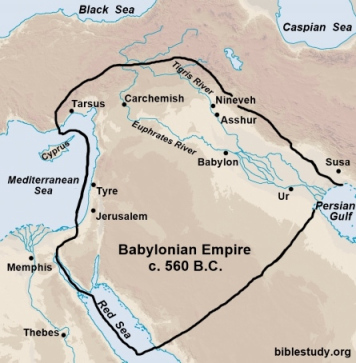In its westward sweep, the Neo-Babylonian Empire destroyed Judah and conquered Egypt. At its peak around 560 B.C., it controlled 193,051 square miles (500,000 square kilometers) of land. Amazingly, Isaiah sang of Babylon's fall one-hundred years before its rise on the world stage (Isaiah 13:1, 13:19, 14:22)! Its fall is prophesied in such detail that even the then unknown Medes are recorded as being its future destroyers (Isaiah 13:17 - 19).
During its short period of dominance, which lasted only until 539 B.C., the Babylonians had several major contacts with God's people. Below is a list of their interactions with the Kingdom of Judah. First, however, is a unique contact made when rival Assyria was still expanding its power as an empire.
Around 701 B.C. God informs Judah's King Hezekiah, through Isaiah, that his sickness will ultimately lead to his death (2Kings 20:1). Hezekiah responds by humbling himself and crying out for mercy. God heals him of his disease and grants him fifteen more years of life. Shortly after he is healed, he receives envoys from Berodach-Baladan, the king of the Neo-Babylonians, congratulating him on his recovery (verses 12 to 14, see also Isaiah 39:1).

Berodach-Baladan, at the time he sent the envoys, may have been a king in exile as Bel-ibni, placed on the throne by the Assyrians, reigned over Babylon from 702 to 700 B.C. One speculation is that Berodach-Baladan, who was active against Assyria, was hoping to elicit favor with Hezekiah as a possible further ally against his enemy.
King Nabopolassar (626 – 605 B.C.)
In 612 Nabopolassar, leading a coalition of other armies, attacks and conquers the Assyrian capital city of Nineveh. This victory announces the rise of the Neo-Babylonians as the world's new military power.
In 609 B.C., as an ally of the Assyrians, a large Egyptian army under Pharaoh Neco (Necho) begins to travel through Judah and Israel on its way north to battle the new superpower. Judah's King Josiah, however, who was likely an ally of Babylon, tries to stop the Egyptians. He fails to halt the Egyptian advance and is killed in battle at Megiddo (2Kings 23:29 - 30, 2Chronicles 35:20 - 35).
King Nebuchadnezzar (605 - 562 B.C.)
Nebuchadnezzar is considered the greatest of all Neo-Babylonian monarchs. In 605, he made his first attack of Jerusalem during the reign of Judah's King Jehoiakim (2Chronicles 36:7). The prophet Daniel and his companions are taken captive.
In 597 B.C., Nebuchadnezzar came up again against Jerusalem during the reign of Judah's King Jehoiachin (2Chronicles 36:10). Jehoiachin is captured and taken captive to Babylon, as well as the prophet Ezekiel and others. Nebuchadnezzar sets up Zedekiah as the new "puppet" King of Judah (2Kings 24 - 25).
In 586 B.C., Jerusalem is attacked a third time by Nebuchadnezzar, this time during the reign of Judah's king Zedekiah. The Babylonians not only destroy the city but also burn Jerusalem's temple and carry away all its treasures.
Evil-Merodach (Amel-Marduk, 561 - 560 B.C.)
This Neo-Babylonian king took King Jehoiachin of Judah out of prison and gave him a place at his table (2Kings 25:27 - 30, Jeremiah 52:31 - 34).
Belshazzar (553 - 539 B.C.)
Neo-Babylonian King Nabonidus rules from 555 to 539 B.C. His son Belshazzar, whose job it was to defend the capital city, co-ruled with him starting in 553. It was Belshazzar who saw God's handwriting on a wall and requested the prophet Daniel interpret the meaning of "Mene, Mene, Tekel, Upharsin" (Daniel 5:25).
The once great empire collapses in 539 B.C. after Persian King Cyrus invades the capital and defeats this world power at the battle of Opis.